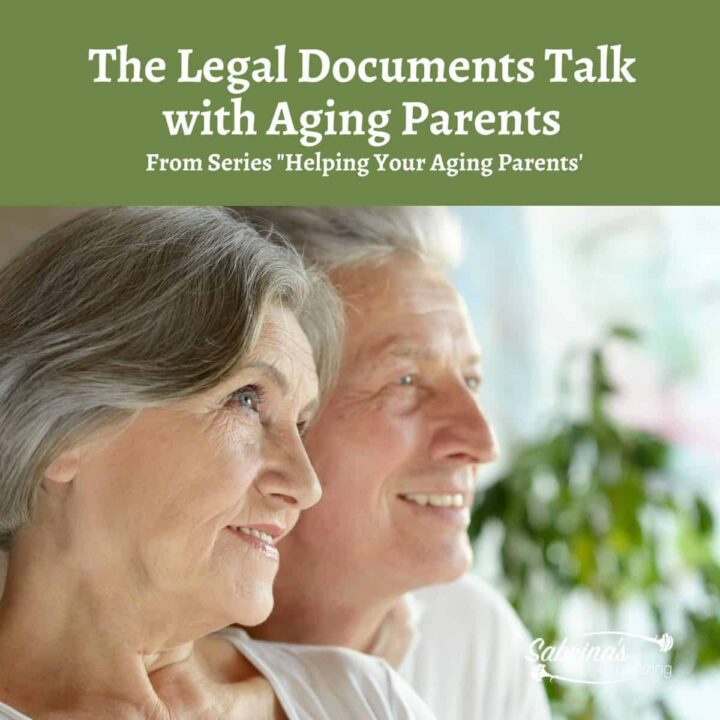After several weeks of discussing how to help your aging parents, this will be the final installment in this series. This post will help you discuss legal documents with your aging parents. It's a sensitive issue, so I'll leave it to the experts.
I interviewed a family friend who does wills and estates at Bort Law in Chester County, Pennsylvania. Peter is the principal of the Law Offices of Peter E. Bort, a member of Divorce Done Right, Inc. (a mediation group), Collaborative Family Law Affiliates, Academy of Family Mediators, Pennsylvania Council of Mediators, and ACR Delaware Valley. Read more about his background and services here.
Jump to:
- What legal documents are necessary to protect one's estate?
- Do you recommend setting up any other documents like checklists or documents that will help children and grandchildren understand the wishes of the deceased?
- When is the best time to create these legal documents?
- How often do you recommend updating these legal documents?
- Since this post is for adult children of seniors downsizing, are there any tips you would like to add to help these individuals deal with their parents?
- Other Legal Documents Tips:
Note from me: Please remember that this may be a touchy subject for your parents, so tread lightly. From my experience, parents tend to talk to their kids about where their legal documents are and what to do but if your parents did not do this, bring up the topic with caution. They may be scared and may react to you asking these questions.
What legal documents are necessary to protect one's estate?
Here is a list of documents needed to protect one's estate: Last Will and Testament, Durable General Power of Attorney, Advanced Healthcare Directive (Living Will and Medical Power of Attorney). Ancillary documents include a Living Trust, Irrevocable Life Insurance Trust, and Body Disposition Affidavit.
Do you recommend setting up any other documents like checklists or documents that will help children and grandchildren understand the wishes of the deceased?
We encourage our clients to leave a memorandum that can be updated more frequently than their will.
Wikipedia defines it as "In law, a memorandum is a record of the terms of a transaction or contract, such as a policy memo, memorandum of understanding, memorandum of agreement, or memorandum of association."
The entire package to help you with hackers, viruses, malware, and ransomware provides up to $1M in potential coverage and so much more! *Note: rate is $47% off the first year! $189.99 / year. Protection for 10 PCs, Macs, Tablets, or Smartphones.
When is the best time to create these legal documents?
When a person reaches 18, they can create these documents. We see people coming to us to do the documents when they have their first child, get married, get divorced, have their first grandchild, etc.
How often do you recommend updating these legal documents?
Life events such as a child's birth, marriage, divorce, and changes in the law all offer opportunities for updating the legal document.
Since this post is for adult children of seniors downsizing, are there any tips you would like to add to help these individuals deal with their parents?
Seniors need to understand that entry to an assisted living or continuing care retirement community is a time when a Durable General Power of Attorney and Living Will are strongly encouraged by the institution. Many seniors believe that they need a Living Trust because they hear about Living Trusts in the national media. The national media takes in states such as California, Florida, and New York, where the probate process can be extremely burdensome without a Living Trust. Pennsylvania is a "probate friendly" state, and there is much less need for a Living Trust if you are a Pennsylvania resident. Living Trusts do not save any taxes and only shift to the present some of the work that needs to be done at the time of the person's passing.
Thank you, Peter, for sharing your wisdom on the matter!
Other Legal Documents Tips:
- Many law offices have a handout or questionnaire that the parents can fill out to help the children know what the parents want at the time of death. When generating the legal documents, ask about these handouts or questionnaires.
- Making a list of treasured items will help with the process of distributing items in the home. This treasured items list doesn't need to be legal but can be stored with the parent's will for safekeeping. Including what the item is, a picture of it, and who to give it to. This will make the process of distribution a lot easier.
I hope this post helps you with your legal documents talk with your aging parents. If you wish to revisit the other posts in this series, feel free to click the titles below. Do you have any additional tips or comments? Please leave a comment below.
The Complete Series:
Feel free to visit the rest of the posts in this series:
THE DOWNSIZING TALK WITH AGING PARENTS
TIPS TO HELP YOUR PARENTS DOWNSIZE THEIR STUFF
HELPING YOUR PARENTS WITH MONEY MATTERS
TIPS TO HELP YOUR PARENTS WITH PAPER MANAGEMENT
HELPING YOUR PARENTS WITH ONLINE ACCOUNTS
TIPS TO HELP YOUR PARENTS WITH LEGAL DOCUMENTS <<THIS POST!!!!
Please note these are affiliate links through Amazon (affiliate), and at no additional cost, I will earn affiliate fees if you decide to make a purchase.








RoseMary Griffith says
Great advice! My husband and I are currently setting this up so that our family never has to deal with any of it. Good stuff.
Krystyna Lagowski says
It's so crucial to have documents like a will and assigning power of attorney! Decisions will need to be made, and it helps to have guidelines. The checklist is good, especially around items like photo albums (remember them?!), and family heirlooms, large and small. Often it's the little things that cause issues, so any clarification that can be made previously - like what happens to the spoon collection - is sure to help!
William Rusho says
Doing these legal documents are so important, also keeping track of them and existing ones.
When the sad day comes when you must sort through a lost loved ones estate, it is vital that you can locate these types of documents.
Donna Janke says
My parents had appropriate legal documents. When they both became ill in the same year and subsequently died, that made a difficult time a little easier for my siblings and I. My brother had been identified as Power of Attorney and I was Executor of the will. Our experience prompted my husband to make sure his mother got all her papers in order. That turned out to be a very good idea as she developed Alzheimer's shortly thereafter. Things were hard enough in the following years, I cannot imagine how my husband and his siblings would have coped if he didn't have Power of Attorney, or what situation what mother-in-law might have wound up in.
Sabrina says
Thank you for sharing, Donna. I hear this often. When something happens, it reminds others to take care of their paperwork. It's great that your parents took the initiative to do the legal documents before hand. When parents have the legal paperwork in order, it gives their children one more I am taking care of you. No one needs to deal with mourning and legal tasks.
Catarina says
After daddy died my brother, who now has a masters in law, took care of all legal issues for mother and it, needless to say, worked very well.
Was personally living abroad so I was very grateful to him for taking care of those issues. Mummy would not have been capable. She didn't even know how to pay a bill when father passed away.
Marquita Herald says
Great series Sabrina. While my parents are long gone, I can certainly appreciate this advice having had to deal with both my father's and my uncle's estates after their passing and neither had taken the time to organize documents. My uncle's was especially challenging since he lived in NY and I had to deal with everything from Hawaii. I've made some notes for my own documents as well. Thanks!
Ken Dowell says
I think one of the most important issues you bring up here is the need to update these documents. It is not just major family changes like births, marraiges and divorces but there might be some seemingly less significant changes like relocation that would have an impact on some of these documents.
Phoenicia says
It is so important to have a will in place, even more so when you have children. The number of people I have met who assume in the case of parents passing away, children will automatically be placed with close family is astonishing.
Sushmita says
Sometimes the topic of making will when discussed with parents too takes a sour turn. Thanks for writing about it. I have known people who had disputes with not even siblings also with close relatives later. Every time i go through your posts some or other person clicks in my head and so is the case this time too.
Philip Turner says
I have seen my parents go through massive trauma as my Dad became ill with Alzheimer's. They had everything on paper ahead of time, fortunately.
The post applies as well to those of us in our 60s, as a memo to get our OWN lives sorted out while we are still capable.
Sabrina says
Thanks for stopping by and sharing in the conversation.
Erica says
It really is important for parents to have a good will. I've known so many adult children who've gotten in deep arguments with their siblings with a parent's passing and a vague will. It seems to bring out the worst in people. Thanks for bringing someone in to explain a little bit more about this subject that can be so overwhelming.
Sabrina says
Thanks, Erica. I totally agree. It's a gray area that needs to be addressed often so people don't forget to take care if it.